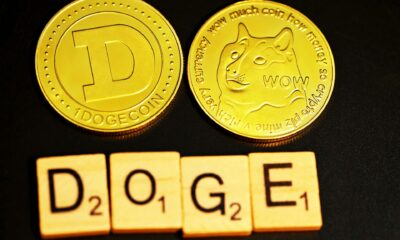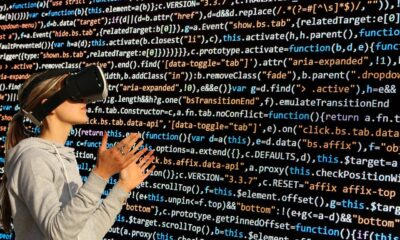Business
Why we expect AR/VR/MR—and this company in particular—to take off faster than Elon Musk’s and SpaceX’s Crew Dragon
While the coronavirus (COVID-19) and its psychological impact ripple across every continent in a never-before-seen craze and panic, it is fair to assume that trillion-dollar industries like travel or event management and event planning will never be the same again. But the AR/VR/MR industry stands to massively benefit from cultural and economic anxiety for years to come.
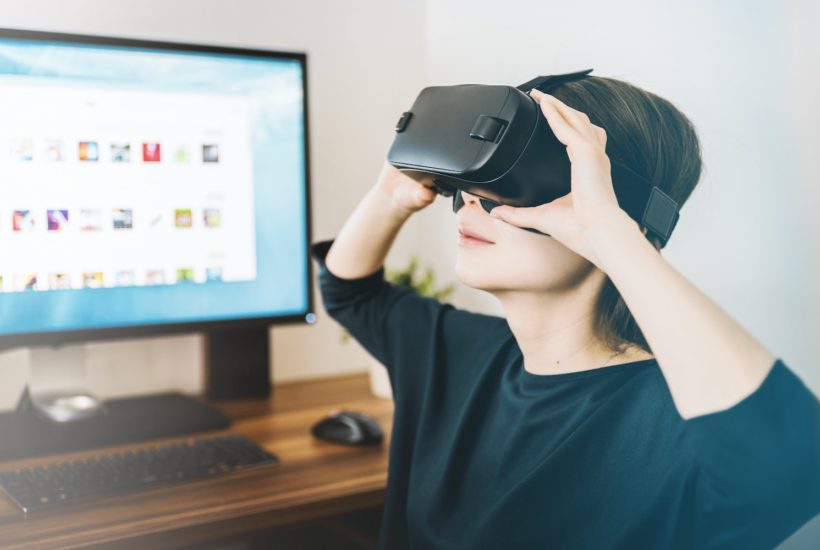
First, let’s state the obvious: the augmented reality (AR), virtual reality (VR), and mixed reality (MR) industry—often referred to as “XR” or extended reality—has been on a tear since long before the spread of the coronavirus, hitting new high notes in late 2019 and early 2020. The installed base of ARCore-compatible Android devices, for example, grew from 250 million devices in December 2018 to 400 million in May 2019.
Meanwhile, 2017 heralded the Cambrian explosion of the AR world, with the introduction of easy-to-use software development kits from both Apple (called ARKit) and Google (called ARCore). And, based on a Forrester report, it is estimated that 14 million American workers are expected to use smart glasses regularly at their jobs by 2025.
A picture often speaks a thousand words. Here is a compelling visual representation that illustrates the growing demand for engineering talent across a variety of fields. Note how the demand for AR/VR engineers dwarfs the second-highest in-demand field by almost 10-1:
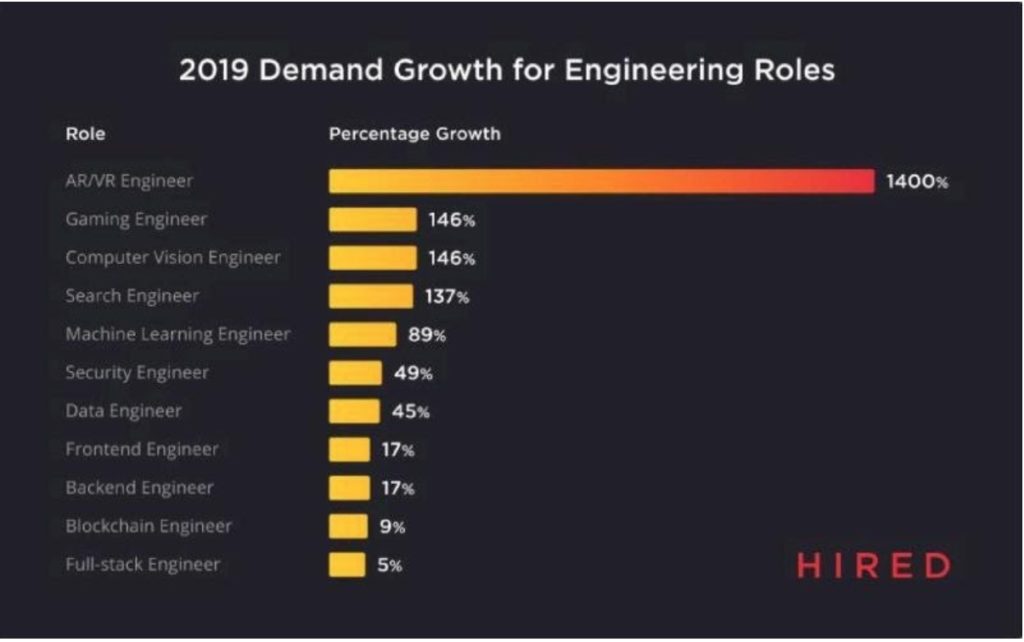
Experts predict the AR/VR industry to reach more than $25 billion by 2025—and that growth is likely to continue steadily beyond the mid-2020s. But the COVID-19 outbreak was the type of black swan effect no one in the industry expected, and it is the type of game-changing event that could propel an already fierce industry further into the spotlight.
AR/VR industry provides haven for skittish investors
On March 11, the National Basketball Association suspended its season indefinitely. At the same time, Twitter employees have started working from home. School systems have also shut down in France, and pretty much everywhere else. Sources at high-profile companies are telling journalists that important, deal-making conferences are being canceled. Startups are having trouble accessing capital, as trips are postponed. Venture capitalists and angel investors are increasingly skittish to invest.
This is the environment we are in—it sounds scary because it is. There is no way to sugarcoat the obvious.
According to EvercoreISI, “…a number of investors note that they are shocked that we haven’t heard anything from the Fed. We only pass this along to highlight how investors are looking for someone, anyone, to be a leader. Maybe what the Fed does is not enough, but if they came out guns blazing and showed leadership (by saying they will do everything they can), that might help.”
So is there any light at the end of this long, dark tunnel? The answer appears to be a resounding yes.
While medical experts are busy tackling the underlying health issues of COVID-19, a number of tech experts predict that the AR/VR industry is about to dramatically reshape and redefine the travel and event industry.
HTC was fast to react to the current situation by hosting the first fully virtual industry conference. The HTC Vive Ecosystem Conference (VEC), usually held in Shenzhen, China, opted for a virtual reality conference instead this year.
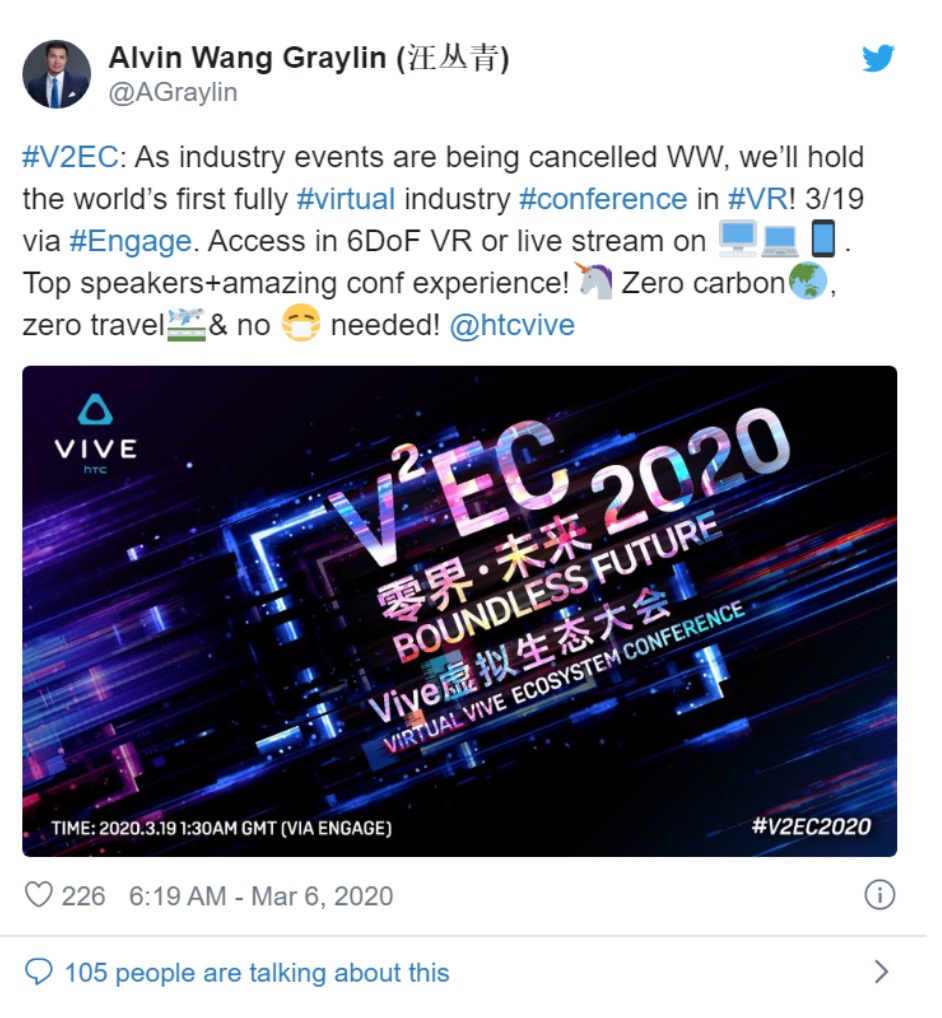
A recent Forbes article stressed the advantages inherent to VR conferencing: “There are many benefits to hosting a conference in VR. These include the possible removal of attendance limits on keynote talks, the option to replay sessions that may have been missed, and zero travel-saving costs and the planet. With the coronavirus situation changing daily, it’s definitely a medium that can help connect people, without risks.”
The first conference to go was Mobile World Congress. Next came Adobe Summit. Then Facebook F8. Within weeks, Google had canceled its annual developer conference, Google I/O, and Google Cloud Next.
Businesses turn to online solutions for physical events
The countless travel and event restrictions have witnessed a flurry of companies (especially startups) rushing to try to re-create the missed experiences—this time online. One such company is France-based XRApplied, a young and innovative company busily working on applying XR technologies towards the resolution of problems that ail specific industries and market sectors, as well as consumers as a whole. The company recently joined UNIQORN, France’s largest rural incubator-accelerator, in an effort to speed up the market penetration of its product and service suite.
Bringing tangible answers to the table is nothing to sneeze at. The business events industry alone is worth $1.5 trillion a year per a recent EIC study. According to the report, “…business events generated $621.4 billion (U.S.) of direct gross domestic product (GDP) and contributed a total global GDP impact of $1.5 trillion.” WIRED also reported that one study from MIT found that scientific collaborations that came out of conference meetings were “more novel, cross-disciplinary and more frequently cited than projects between two researchers in the same institution.”
As history has shown over and over, it’s during recessions and hard times that startups shine, bringing forth long-term solutions to problems we as humans did not even know we had, at least prior to black-swan events like COVID-19. The coronavirus is expected to have a significant impact on location-based VR operations like The VOID, Dreamscape, Zero Latency, and Hologate. Moreover, “social VR” is expected to take off faster than Elon Musk’s giant rockets. If you ever needed to brace yourself for a brave new world, today is the day.
—
(Featued image by JESHOOTS.COM on Unsplash)
DISCLAIMER: This article was written by a third party contributor and does not reflect the opinion of Born2Invest, its management, staff or its associates. Please review our disclaimer for more information.
This article may include forward-looking statements. These forward-looking statements generally are identified by the words “believe,” “project,” “estimate,” “become,” “plan,” “will,” and similar expressions. These forward-looking statements involve known and unknown risks as well as uncertainties, including those discussed in the following cautionary statements and elsewhere in this article and on this site. Although the Company may believe that its expectations are based on reasonable assumptions, the actual results that the Company may achieve may differ materially from any forward-looking statements, which reflect the opinions of the management of the Company only as of the date hereof. Additionally, please make sure to read these important disclosures.

-

 Crypto2 weeks ago
Crypto2 weeks agoCaution Prevails as Bitcoin Nears All-Time High
-

 Africa6 days ago
Africa6 days agoBridging Africa’s Climate Finance Gap: A Roadmap for Green Transformation
-

 Biotech2 weeks ago
Biotech2 weeks agoEcnoglutide Shows Promise as Next-Generation Obesity Treatment
-

 Business4 days ago
Business4 days agoThe TopRanked.io Weekly Digest: What’s Hot in Affiliate Marketing [uMobix Affiliate Program Review]





